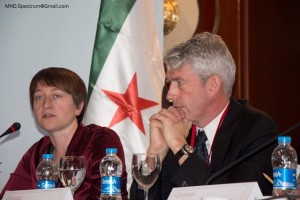Transitional Justice in Syria: Accountability and Reconciliation Conference
I spent last weekend in Istanbul at an excellent conference organized by the Syrian Center for Political and Strategic Studies (SCPSS). The conference included numerous non-governmental organizations (NGOs) from Syria as well as international human rights researchers and advocates. Families of victims told their stories, data collection groups discussed the challenges, and need, to document violations, transitional justice experts worried about infrastructure such as the police force and judicial system, and local leaders pledged to work together for peace.
I was invited to speak about HRDAG’s recent report examining killings in Syria documented by seven data collection groups. My talk mostly focused on the technical challenges involved in comparing over 147,000 records to identify the 59,648 unique records of deaths. (We will describe this process, which we call matching, in a later blogpost.)
As you might imagine, focusing on the technical, scientific details of this work, in front of a diverse audience that includes victims’ family members, is more than a little daunting. This is one of the most difficult aspects of my work – every day we analyze data that describes the deaths of individual human beings. Every one of those individuals deserves respect and recognition. Which is why we rely on rigorous scientific analysis – every one of those victims, named or unnamed, documented or undocumented, deserves to be counted. To provide those victims, and their families, with the best science has to offer, I have to think, and often speak, like a scientist. Unfortunately, scientific language has a tendency to sound detached. I am trained in this language (I have my PhD in Biostatistics) and it serves me well when writing an academic article or presenting at my professional association’s annual meeting. It also enables the narrow focus on the problem at hand required by rigorous scientific analysis. The kind of analysis which I believe can contribute to accountability and justice. But it often masks the empathy I feel for victims’ families.
I am constantly learning, and working to improve the language I use to discuss our methods and present our results. I know the words I choose can have an emotional affect on people. I think I did ok last weekend, at least based on the positive interactions I had with a variety of conference attendees throughout the weekend. Top among those interactions were discussions with representatives from the Syrian Network for Human Rights and the Violations Documentation Center. Both groups are doing incredibly impressive work documenting the ongoing violence in Syria. It was great to meet them, learn more about their documentation practices, and hear that they find our report interesting and useful. We hope to collaborate more with them in the future.
[Creative Commons BY-NC-SA excluding photo]
